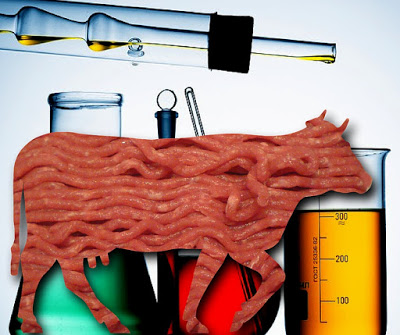Posed as the perfect neoliberal solution to relieving speciesism while protecting markets and consumer desires, a number of non-profits have positioned themselves in support of in vitro research in pursuit of “lab grown meat.” However, I am critical of solutions that seek to address the inherent problems of free market capitalism with yet more free market capitalism.
Consider that in vitro meat, while theoretically sparing millions of nonhumans the torture of agricultural industries, completely overlooks the millions of other nonhumans raised in the food system who are not directly slaughtered for their flesh, as well as those who exist outside the food industry altogether. Indeed, the most glaring shortcoming of the in vitro scheme is that it overlooks speciesist attitudes as problematic in of themselves.
In vitro meat purports to meet the supposedly insatiable public demand for Nonhuman Animal flesh (a demand that is, incidentally, artificially controlled by industry) without the guilty conscience of knowing this consumption requires the killing of Nonhuman Animals or considerable environmental pollution. Yet, only a portion of the nonhumans humans exploit are specifically raised for “meat.” In vitro schemes beg the question as to what will happen to nonhumans who are indirectly killed for flesh when their bodies become unproductive in other industries.
Dairy cattle, veal calves, wool producing sheep, layer hens, and racehorses, for example, all go to slaughter when their bodies become “spent” and they become a burden on the industry. Unless dairy and eggs become obsolete, these animals will still be sent to their deaths regardless of in vitro markets.
And what of “leather” and “fur”? In vitro meat does nothing to reduce the demand for animal flesh used for fashion.
What of rodeos, zoos, and circuses? In vitro is totally unrelated.
And vivisection? Not only does in vitro fail to solve the problem of using Nonhuman Animals as test subjects, but it will inevitably require considerable amounts of pain and death to create in vitro meat.
In a nutshell, the in vitro meat scheme ignores speciesism. It ignores an ideology of oppression. Beyond excluding many other facets of animal exploitation, it also condones the consumption and oppression of Nonhuman Animals as a symbolic matter. To “okay” this behavior, even if it is not directly hurting the select few nonhumans represented, is hugely detrimental to the advancement of Nonhuman Animal rights.
Consider a campaign to reduce sexual harassment and violence against women in which non-profits and activists strategically offer blow up dolls or “real dolls” for men to insult, beat, brutalize, or otherwise have their way with. Surely, some women will directly benefit in having the wrongs usually inflicted upon them now inflicted on their non-sentient representations. But, one must consider the symbolic consequences that will inevitably arise in a society that has normalized objectifying, sexist, and violent attitudes towards women. One could not expect that the position of women would be advanced to any significant extent if representations of women (that are actual objects) are made freely available for the privileged to buy, sell, trade, consume, and dominate. Sexism and violence would (and do) continue against women. This happens because such a strategy only supports women’s subjugated status and aggravates their objectification. A society that symbolically normalizes oppression will facilitate actual oppression. That’s common sense.

If activists are in the business of combating speciesism, then in vitro meat should not be included on the tactical platter. It’s only meaningful relationship to anti-speciesism is its potential to assuage the human guilt that inevitably arises from the unnecessary consumption of sentients. The core concern, that being the rights owed to Nonhuman Animals, is obscured. Incidentally, in vitro meat schemes also ignore the terrible damage that animal products inflict on the health of vulnerable human communities.
This willful obfuscation is a strong indication that in vitro meat is a manifestation of post-speciesism. Post-speciesism supposes that speciesism is a thing of the past, or is otherwise being attended to. Species difference is thus made irrelevant, and systemic discrimination is made invisible by the fantasy. It is an ideology that works to squelch political opposition and the potential for contentious action.
In vitro meat will reduce some violence against some Nonhuman Animals, but it will allow for many other forms of violence. It reproduces the notion that Nonhuman Animals are “food,” and the institutions slaughtering them as such will not realistically end simply because in vitro becomes available. So long as prejudice and discrimination against other animals remains unchallenged, their exploitation and death will continue indefinitely.
Considering the limited nature of activist time and resources, I suggest instead a structural focus that centers the promotion of veganism. The results will be far more socially rewarding: environmental destruction will be reduced, human health will flourish, and, more importantly, Nonhuman Animals will be afforded the equal consideration they deserve. Relying too heavily on scientific and technological advancements to solve social problems could prove disastrous (though they tend to be friendlier to the capitalist interests of non-profits and their funders). In vitro science is a display of domination and privilege with limited cultural potential for achieving social justice.
A version of this essay was originally published on The Examiner on July 17, 2012.

Readers can learn more about the social psychology of veganism in my 2016 publication, A Rational Approach to Animal Rights. Receive research updates straight to your inbox by subscribing to my newsletter.
